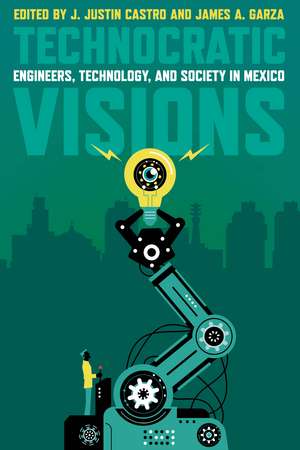Technocratic Visions: Engineers, Technology, and Society in Mexico
Editat de J. Justin Castro, James A. Garzaen Limba Engleză Hardback – 4 oct 2022
Preț: 419.12 lei
Nou
Puncte Express: 629
Preț estimativ în valută:
80.20€ • 83.95$ • 66.75£
80.20€ • 83.95$ • 66.75£
Carte disponibilă
Livrare economică 10-24 martie
Preluare comenzi: 021 569.72.76
Specificații
ISBN-13: 9780822947486
ISBN-10: 082294748X
Pagini: 302
Dimensiuni: 152 x 229 x 30 mm
Greutate: 0.36 kg
Editura: University of Pittsburgh Press
Colecția University of Pittsburgh Press
ISBN-10: 082294748X
Pagini: 302
Dimensiuni: 152 x 229 x 30 mm
Greutate: 0.36 kg
Editura: University of Pittsburgh Press
Colecția University of Pittsburgh Press
Recenzii
“Histories of engineers and engineering are scarce, and much needed. We live, after all, in a fully engineered world. This volume offers a superb collection of case studies examining the rise and importance of engineering in Mexico’s modern history. Essential to understanding twentieth-century Mexico, Technocratic Visions also offers an important contribution to comparative national histories.” —Edward Beatty, University of Notre Dame
“This book addresses one of the greatest perceived contradictions of Mexican and Latin American science and technology studies and history: How (and why) did the influence of unelected technocrats increase as the country ostensibly moved toward greater democratization? The individual chapters analyze the social costs and benefits of the technocratic approach to Mexican government. The rich analyses and the deep theoretical and empirical contextualization ensure that it will be a key reference point in Mexican science and technology studies for years to come.” —David S. Dalton, author of Mestizo Modernity: Race, Technology, and the Body in Postrevolutionary Mexico
"For scholars of science, technology, and engineering, this collection edited by Castro and Garza is required reading."
—Carlos S. Dimas, University of Nevada Las Vegas
"This book is an excellent contribution to Mexicanist historiography on STS, especially because it stresses the importance of noneconomic technocracy on Mexican state formation."
—Hispanic American Historical Review
"Essays in this volume will be useful independently for teaching and research for historians of technology, the environment, education, and Mexico writ large. Read as a whole, the contributions of Technocratic Visions are larger, reframing Mexican chronologies away from presidential regimes and asserting the country’s vitality as a space of technological and political innovation with regard to government-directed scientific interventions and, most important, popular involvement with them."
—Isis
“This book addresses one of the greatest perceived contradictions of Mexican and Latin American science and technology studies and history: How (and why) did the influence of unelected technocrats increase as the country ostensibly moved toward greater democratization? The individual chapters analyze the social costs and benefits of the technocratic approach to Mexican government. The rich analyses and the deep theoretical and empirical contextualization ensure that it will be a key reference point in Mexican science and technology studies for years to come.” —David S. Dalton, author of Mestizo Modernity: Race, Technology, and the Body in Postrevolutionary Mexico
"For scholars of science, technology, and engineering, this collection edited by Castro and Garza is required reading."
—Carlos S. Dimas, University of Nevada Las Vegas
"This book is an excellent contribution to Mexicanist historiography on STS, especially because it stresses the importance of noneconomic technocracy on Mexican state formation."
—Hispanic American Historical Review
"Essays in this volume will be useful independently for teaching and research for historians of technology, the environment, education, and Mexico writ large. Read as a whole, the contributions of Technocratic Visions are larger, reframing Mexican chronologies away from presidential regimes and asserting the country’s vitality as a space of technological and political innovation with regard to government-directed scientific interventions and, most important, popular involvement with them."
—Isis
Notă biografică
J. Justin Castro is associate professor and the chair of the Department of History at Arkansas State University. He is the author of Radio in Revolution: Wireless Technology and State Power in Mexico, 1897–1938 and Apostle of Progress: Modesto C. Rolland, Global Progressivism, and the Engineering of Revolutionary Mexico.
James A. Garza isassociate professor of history and ethnic studies at the University of Nebraska–Lincoln. His research focuses on nineteenth-century Mexico and global/comparative environmental history. He is the author of The Imagined Underworld: Sex, Crime and Vice in Porfirian Mexico City.
James A. Garza isassociate professor of history and ethnic studies at the University of Nebraska–Lincoln. His research focuses on nineteenth-century Mexico and global/comparative environmental history. He is the author of The Imagined Underworld: Sex, Crime and Vice in Porfirian Mexico City.
